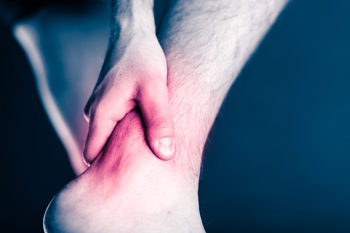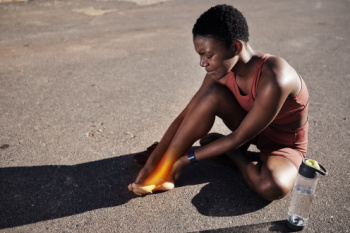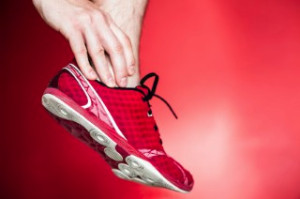Dr. Kennan T. Runte, DPM, FACFAS
Dr. Panah Nabili, DPM
Grass Valley, CA 95945
Dr. Kennan T. Runte, DPM, FACFAS
Dr. Panah Nabili, DPM

An Achilles tendon rupture is a significant injury that often occurs during sports or sudden movement, usually felt as a sharp pain or a popping sensation in the back of the ankle. Walking becomes difficult, and pushing off the foot may feel impossible. Management depends on the severity of the tear and the patient’s overall health and activity level. Non-surgical treatment includes immobilization with a cast or walking boot, followed by specific exercises to restore strength and flexibility. Surgical repair may be recommended for younger or more active individuals to reduce the risk of re-rupture and support a quicker return to activity. Both approaches require a period of rest, followed by a carefully guided rehabilitation program. Prompt diagnosis is key to determining the most effective treatment. If you experience sudden pain or loss of function in your lower leg, it is suggested you see a podiatrist for a diagnosis and appropriate treatment.
Achilles tendon injuries need immediate attention to avoid future complications. If you have any concerns, contact one of our podiatrists of Foothill Podiatry Clinic. Our doctors can provide the care you need to keep you pain-free and on your feet.
What Is the Achilles Tendon?
The Achilles tendon is a tendon that connects the lower leg muscles and calf to the heel of the foot. It is the strongest tendon in the human body and is essential for making movement possible. Because this tendon is such an integral part of the body, any injuries to it can create immense difficulties and should immediately be presented to a doctor.
What Are the Symptoms of an Achilles Tendon Injury?
There are various types of injuries that can affect the Achilles tendon. The two most common injuries are Achilles tendinitis and ruptures of the tendon.
Achilles Tendinitis Symptoms
Rupture Symptoms
Treatment and Prevention
Achilles tendon injuries are diagnosed by a thorough physical evaluation, which can include an MRI. Treatment involves rest, physical therapy, and in some cases, surgery. However, various preventative measures can be taken to avoid these injuries, such as:
If you have any questions please feel free to contact our office located in Grass Valley, CA . We offer the newest diagnostic tools and technology to treat your foot and ankle needs.

Feet work hard every day, so it is no surprise that they are prone to a variety of issues. Some of the most common foot problems include bunions, which cause a painful bump at the base of the big toe, and plantar fasciitis, a leading cause of heel pain. Flat feet, high arches, and hammertoes can also lead to discomfort and imbalance. Corns, calluses, and ingrown toenails are often caused by pressure or wearing poor-fitting shoes. Fungal infections like athlete’s foot or toenail fungus are also common, especially in damp environments. Overuse, aging, and medical conditions such as diabetes or arthritis can contribute to or worsen these issues. While some problems may improve with simple changes in footwear or home care, persistent pain or changes in the appearance of the feet should not be ignored, and it is suggested that you see a podiatrist.
Foot Pain
Foot pain can be extremely painful and debilitating. If you have a foot pain, consult with one of our podiatrists from Foothill Podiatry Clinic. Our doctors will assess your condition and provide you with quality foot and ankle treatment.
Causes
Foot pain is a very broad condition that could be caused by one or more ailments. The most common include:
Diagnosis
To figure out the cause of foot pain, podiatrists utilize several different methods. This can range from simple visual inspections and sensation tests to X-rays and MRI scans. Prior medical history, family medical history, and any recent physical traumatic events will all be taken into consideration for a proper diagnosis.
Treatment
Treatment depends upon the cause of the foot pain. Whether it is resting, staying off the foot, or having surgery; podiatrists have a number of treatment options available for foot pain.
If you have any questions, please feel free to contact our office located in Grass Valley, CA . We offer the newest diagnostic and treatment technologies for all your foot care needs.

Cracked heels are a common foot issue, but in individuals with diabetes, they can signal more serious concerns. Diabetes often leads to dry skin due to reduced oil and sweat gland function, especially in the feet. This dryness increases the risk of skin cracking, particularly around the heels where pressure is greatest. Poor circulation and nerve damage associated with diabetes can prevent individuals from noticing early signs of skin breakdown. When cracks deepen, they can allow bacteria to enter, raising the risk of infection. Healing may also be slower due to impaired blood flow. Proper foot care is essential for people with diabetes. If you have diabetes and have developed cracked heels, it is suggested that you are under the care of a podiatrist who can treat foot problems and help you to manage this condition.
Diabetic foot care is important in preventing foot ailments such as ulcers. If you are suffering from diabetes or have any other concerns about your feet, contact one of our podiatrists from Foothill Podiatry Clinic. Our doctors can provide the care you need to keep you pain-free and on your feet.
Diabetic Foot Care
Diabetes affects millions of people every year. The condition can damage blood vessels in many parts of the body, especially the feet. Because of this, taking care of your feet is essential if you have diabetes, and having a podiatrist help monitor your foot health is highly recommended.
The Importance of Caring for Your Feet
Patients with diabetes should have their doctor monitor their blood levels, as blood sugar levels play such a huge role in diabetic care. Monitoring these levels on a regular basis is highly advised.
It is always best to inform your healthcare professional of any concerns you may have regarding your feet, especially for diabetic patients. Early treatment and routine foot examinations are keys to maintaining proper health, especially because severe complications can arise if proper treatment is not applied.
If you have any questions please feel free to contact our office located in Grass Valley, CA . We offer the newest diagnostic and treatment technologies for all your foot and ankle needs.

Ankle pain after running is a common complaint, but it is often preventable with the right approach. Warming up before a run and stretching afterward can improve flexibility and reduce strain on the ankles. Strengthening the muscles surrounding the ankle through targeted exercises also helps provide better support during runs. Wearing proper running shoes with good arch support and cushioning is essential. Replace worn-out shoes regularly to avoid uneven pressure on your feet and ankles. Running on even surfaces can also reduce the risk of rolling or straining the ankle. Gradually increasing your distance and intensity gives your body time to adjust without overloading your joints. If you experience persistent ankle pain after running, it is important to consult a podiatrist, who can identify underlying issues and recommend treatment options or custom orthotics to help keep you running comfortably.
Ankle pain can be caused by a number of problems and may be potentially serious. If you have ankle pain, consult with one of our podiatrists from Foothill Podiatry Clinic. Our doctors will assess your condition and provide you with quality foot and ankle treatment.
Ankle pain is any condition that causes pain in the ankle. Due to the fact that the ankle consists of tendons, muscles, bones, and ligaments, ankle pain can come from a number of different conditions.
Causes
The most common causes of ankle pain include:
Symptoms
Symptoms of ankle injury vary based upon the condition. Pain may include general pain and discomfort, swelling, aching, redness, bruising, burning or stabbing sensations, and/or loss of sensation.
Diagnosis
Due to the wide variety of potential causes of ankle pain, podiatrists will utilize a number of different methods to properly diagnose ankle pain. This can include asking for personal and family medical histories and of any recent injuries. Further diagnosis may include sensation tests, a physical examination, and potentially x-rays or other imaging tests.
Treatment
Just as the range of causes varies widely, so do treatments. Some more common treatments are rest, ice packs, keeping pressure off the foot, orthotics and braces, medication for inflammation and pain, and surgery.
If you have any questions, please feel free to contact our office located in Grass Valley, CA . We offer the newest diagnostic and treatment technologies for all your foot care needs.